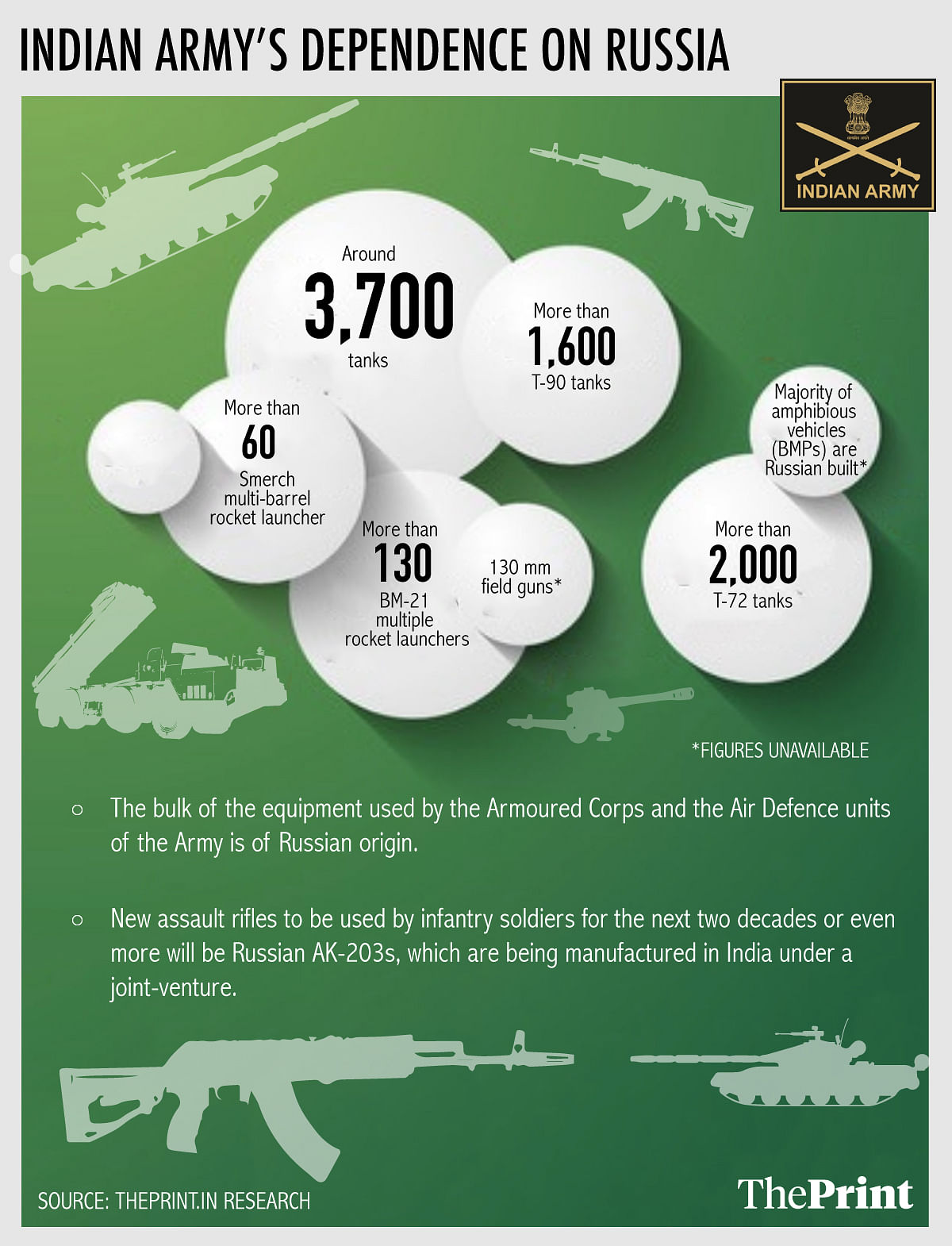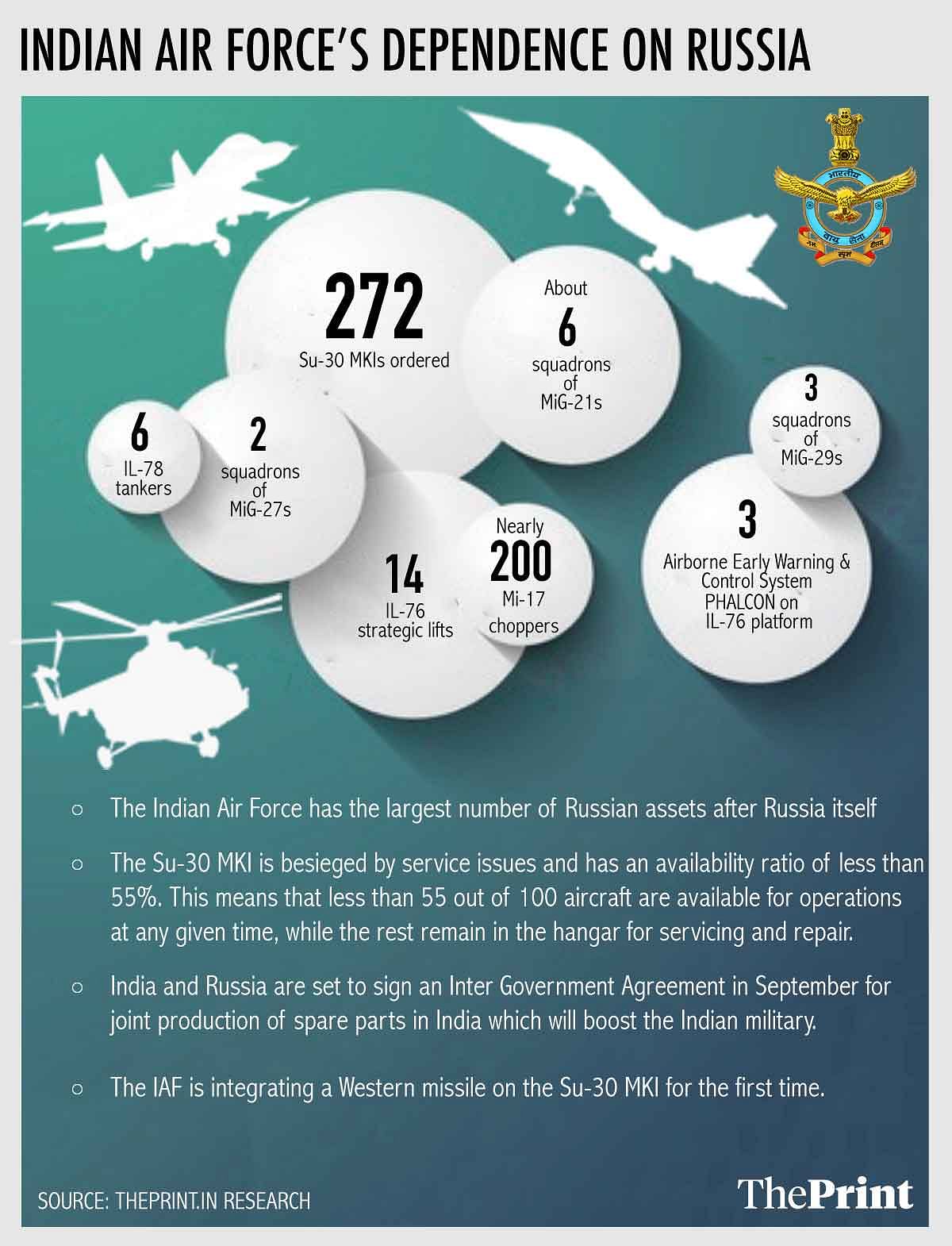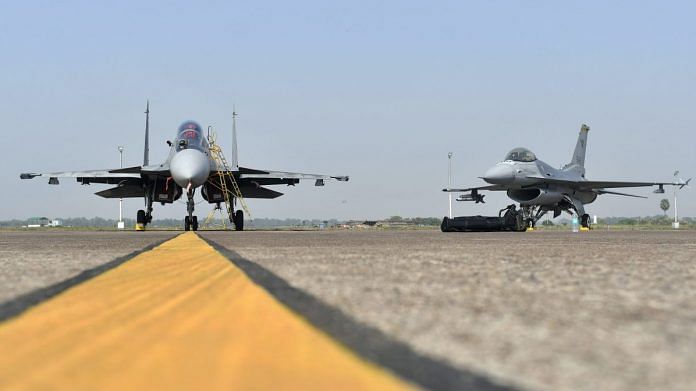New Delhi: An air defence system for US$5.2 billion, joint ventures to manufacture Kamov helicopters and nearly 7 lakh Kalashnikov rifles, nuclear submarines on loan for $3 billion, and many more tempting offers in the pipeline. For all those who thought the US, France and Israel were India’s new, reliable defence equipment suppliers, there is news: Russia is back.
The last two years have witnessed an upswing in the India-Russia defence relationship, with New Delhi signing deals worth US$14 billion with Moscow.
More key deals worth over a billion dollars are expected to be signed this year, including those for additional Su-30 MKI aircraft and about 21 MiG-29 fighters for the Indian Air Force, and the very short-range air defence system (VSHORADS).
The Russians are also eyeing the mega ‘Project 75 India’ of the Indian Navy, under which six new conventional submarines are to be built. Then there is the IAF’s big-ticket contract for 114 fighter jets, for which the Russians are offering two aircraft — Su-35 and MiG-35.
The turnaround is impressive because, since 2004, the US has replaced Russia as India’s main supplier for new defence equipment, along with Israel and France.
Russia, meanwhile, accounted for 58 per cent of Indian arms imports in 2014-18, down from 76 per cent in 2009-13. Most imports from Russia were repeat orders for existing equipment, and not new equipment.
Also read: After trade war, Trump wants to punish India for Russian defence purchases
The highs and lows of the relationship
Historically, India has been dependent on Russia, and the Soviet Union before that, for defence equipment. Following the 1974 nuclear test by India, no Western power was willing to supply modern technology, which was grappling to stay fighting fit against Pakistan, and seeking to create some sort of capability against China.
This is when the USSR came to India’s help, and then-prime minister Indira Gandhi built a special relationship that resulted in the purchase of submarines, tanks, aircraft and many other equipment, which were used to keep the Indian military strong. Even today, about 60 per cent of Indian military equipment is of Russian origin.
However, the relationship took a hit in the 1990s, when the Russians becoming more pro-West, said Kanwal Sibal, former Indian ambassador to Moscow. He said the Russian government saw India as being part of the USSR era.
“Russia did not even support India following the 1998 nuclear tests. But things changed after Putin took over. The relationship has stabilised,” he said.
Sibal said following the India-US nuclear deal in 2008, there was lot of suspicion and concern in Russia.
The slump in the partnership from the beginning of the 21st century prompted Russia to even hold exploratory talks with Pakistan for defence cooperation. But in the last three years, the Narendra Modi government has gone back to Russia for new equipment, much to the discomfort of the US.

The resurgent India-Russia relationship comes in the backdrop of looming US sanctions, but the old partners have worked out a new payment method which they hope will escape the Countering American Adversaries Through Sanctions Act, or CAATSA.
India ‘buying the best’, Russia upbeat
The spate of orders has left many within the strategic community wondering if India is realigning itself with Russia, and whether it makes good sense to put all eggs in one basket. It has also led to many muted questions on what will happen after Russian President Vladimir Putin goes.
Sources in the Indian government sought to allay such fears, saying that India maintains good relations with both the US and Russia. They say India is not aligning with any power, but is looking out for the best interests of the country.
“As far as defence equipment is concerned, India is buying the best. Let us take the example of the S- 400. There is no system in the world which matches the ability of the Russian system, hence the decision to go for it. Russia and India share historical defence ties and the world is aware of this,” a senior official told ThePrint.
The official pointed out that the new aircraft bought for the IAF, the Rafale, is French, and that transport aircraft bought are American.
However, the Russians are upbeat and see the resurgent defence ties as a turnaround.
“Defence cooperation is the backbone of our bilateral relationship and we are of course interested in developing future long-term projects with India,” said Vladimir Drozhzhov, deputy director of Russia’s Federal Service of Military-Technical Cooperation (FSMTC).
Drozhzhov expressed satisfaction at the current level of defence ties, and said the future looks bright as the focus is on joint partnership and ‘Make in India’.

Back to the ’70s and ’80s? Not quite
Another top Russian official said the relationship is heading back to what it was in the 1970s and the 1980s.
“Given how the US behaves, I will not be surprised if India wonders ‘who now’,” said Alexei Rakhmanov, president of Russia’s United Ship Building Corporation. He pointed to the trend of the US always having one adversary in the world, and the recent trade tensions between India and the US, summed up by President Donald Trump’s tweet.
However, many experts don’t see things going back to the good old days.
“This is not even 60 per cent of what it was earlier,” said Nandan Unnikrishnan, vice-president of the Observer Research Foundation.
He said India is cleverly maintaining its relationship with Russia as it neither wants a Moscow-Beijing hegemony in the region, nor an American one.
“We often tend to see India-Russia ties through the prism of the US. But remember that originally it was China that held us together, and that stands even today. We can’t have Russia and China together. It is in India’s interest that Russia does not depend too much on China,” he said.
Unnikrishnan added that India wants to build a stronger relationship with Russia, but Moscow does not have many strengths in other spheres of trade and business.
“Hence, military is the one area that keeps us bonded,” he said.
Even others feel the relationship is not back to what it was in the 1970s and 1980s. “It is not even back to what it was in the 1990s,” said Petr Topychkanov, senior associate at Stockholm International Peace Research Institute (SIPRI).
Topychkanov said while India is going in for new defence ties with Russia, it has also been selective about the defence spheres where it wants Moscow’s help. He argued that the number of S-400 systems ordered by India is not enough for safeguarding its entire border, so it will help India gain experience for its own indigenous air defence programme.
Why India & Russia need each other
Sibal said while one should not expect complete convergence between the two countries on all issues, the fact is that defence is a core area for both countries and Russia is the only country which can transfer high technology to India.
Another keen observer of the India’s foreign policy, who wished to remain anonymous, said that although energy relations with Russia are deepening, the overall economic relationship remains limited since the Russian economy is performing poorly. The expert said India needs Russia for military spare parts, just as Moscow needs New Delhi for revenue.
He argued that there are technologies like nuclear submarines that only Russia will provide, not the US. Also, it is important to maintain ties with Russia as it wields a powerful veto at the UN Security Council, and multilateral cooperation extends to BRICS and the Shanghai Cooperation Organisation.
With China and Pakistan in mind, India will be wary of making Russia unhappy. India’s relationship with Russia will continue, even if it draws the ire of Europe and the US, he said.

Also read:US against any country purchasing Russia’s S-400 missile defence system: Pentagon




Remember the days,the USA,blocked Russian Cryogenic Engines,sales to India,thus stopping the advance of our Space programme?The USA has not changed.It wants its Tech to be protected offering low tech to India.Russia on the other hand is willing to offer High Tech [Of course,keeping .its Tech secret to an extent,but India benefits by Russian Military Wares]]
Completely absurd for a third party to believe India can be persuaded to stop buying military hardware from Russia, go to the extent of threatening sanctions if it does. One hopes the consequences of Lemoa, Comcasa and all the other acronyms have been thought through. It should not be the case that Indian facilities become available for the invasion of Iran.